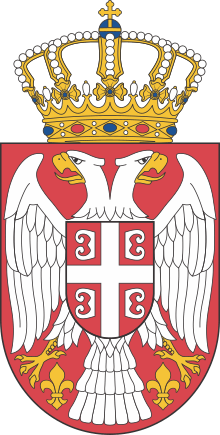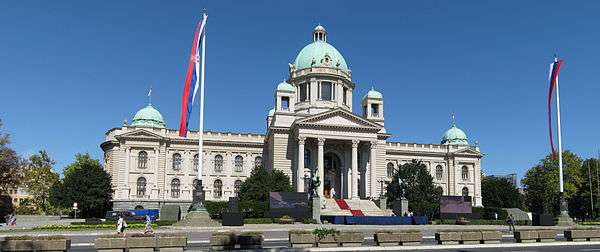Politics of Serbia
The politics of Serbia function within the framework of a parliamentary democracy. The prime minister is the head of government, while the president is the head of state. Serbia is a parliamentary republic composed of three branches of government: an executive, legislature, and judiciary.
 |
|---|
| This article is part of a series on the politics and government of Serbia |
|
|
Legislature
|
|
Judiciary
|
|
|
The Economist Intelligence Unit rated Serbia a "flawed democracy" in 2019.[1]
Government
Executive
| Office | Name | Party | Since |
|---|---|---|---|
| President | Aleksandar Vučić | Progressive Party | 31 May 2017 |
| Prime Minister | Ana Brnabić | Progressive Party | 29 June 2017 |
Executive power is exercised by the prime minister, who heads a cabinet. The prime minister is chosen by the National Assembly on the proposal of the president, who names the designate after consultations with all parliamentary leaders. The president is elected based on popular vote, but has little governing power and is primarily a ceremonial position. The president’s term lasts five years and can be elected for at most 2 terms. Cabinet ministers are nominated by the prime minister and confirmed by the National Assembly. Governing power is vested in the prime minister, deputy prime ministers and other ministers. The prime minister is responsible for presenting their agenda to the National Assembly as well as proposing the ministers to fill the cabinet posts in their government. The government is considered elected if it has been elected by a majority vote of all representatives in the National Assembly.[2]
Legislature

Legislative power is vested in the unicameral parliament known as the National Assembly, which is composed of 250 proportionally elected deputies by secret ballot. The National Assembly also wields constitutional authority in the republic.[3]
Judiciary
The judicial system of Serbia is headed by the Supreme Court of Cassation. The court reviews and possibly rules on past court cases made at the lower court levels. The 2008 Law on Organization of Courts greatly decreased the number of courts in Serbia - from 168 to 64. In addition, many different court tiers were established: the Basic, High, and Appellate Courts and as previously mentioned, the Supreme Court of Cassation.[4] There are also special courts of jurisdiction, such as the Commercial Court, Commercial Court of Appeal, Administrative Court of Serbia.
Parties and elections
Serbia uses the multi-party system, with numerous political parties in which no one party often has a chance of gaining power alone, this results in the formation of coalition governments. Elections are held on the parliamentary, provincial and local level, and are scheduled every four years, while presidential elections are scheduled every five years.
International Organizations
UN, OSCE, Council of Europe, BSEC, NATO Partnership for Peace, CEFTA, ICC, IMF, World Bank, Southeast European Cooperation Process, Stability Pact for Southeastern Europe, Southeast European Cooperative Initiative, Central European Initiative.
Serbia was granted candidate status for membership in the European Union (EU) and it submitted its application 4 years earlier. Serbia made progress in meeting the criteria established by the European in recent years. For example, Serbia provided majority municipalities in Kosovo with broad powers in education, healthcare and spatial planning.[5]
It is also a candidate for the World Trade Organization[6] (WTO) and was[7] expected to join by 2013.
Status of Kosovo
Kosovo, on the other hand, has been deemed a United Nations protectorate since 1999. On 17 February 2008 ethnic Albanians in the region declared Kosovo’s independence and sought the recognition of foreign nations. The Serbian government did not recognize this attempted demand for independence and saw and is null under the UN Charter and the Serbian constitution. Although the Serbian government has stated it shall not acknowledge Kosovo’s independence, it has stated that Serbia wants a “normal life for all the people in Kosovo".[8]
See also
- Constitution of Serbia
- List of Ambassadors from Serbia
References
- The Economist Intelligence Unit (8 January 2019). "Democracy Index 2019". Economist Intelligence Unit. Retrieved 13 January 2019.
- "Archived copy". Archived from the original on 24 May 2015. Retrieved 24 May 2015.CS1 maint: archived copy as title (link)
- "Archived copy". Archived from the original on 24 May 2015. Retrieved 24 May 2015.CS1 maint: archived copy as title (link)
- http://www.osce.org/serbia/82759?download=true
- "Archived copy". Archived from the original on 30 May 2015. Retrieved 24 May 2015.CS1 maint: archived copy as title (link)
- "Trade Profiles". stat.wto.org. Archived from the original on 6 April 2017. Retrieved 14 May 2014.
- "WTO - 2013 News items - Serbia a few steps away from concluding WTO accession negotiations". www.wto.org.
- https://web.archive.org/web/20150524194459/http://www.forumserbia.eu/P42A7C28S6/Political-structure.htm. Archived from the original on 24 May 2015. Missing or empty
|title=(help)
| Wikimedia Commons has media related to Politics of Serbia. |